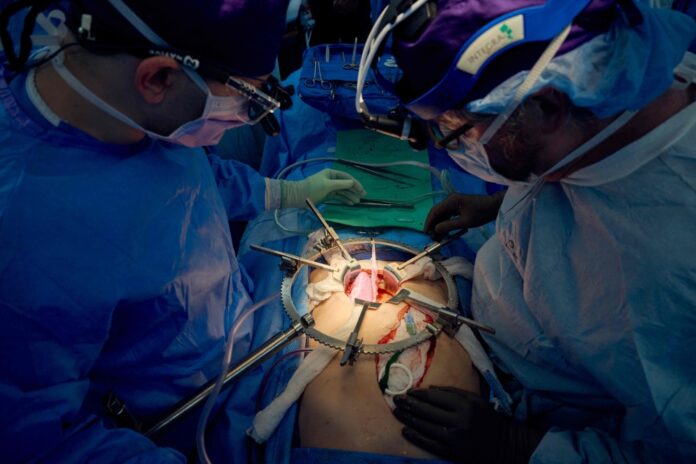KUALA LUMPUR, Feb13 — “Within four years, 50 per cent of kidney failure patients will die without a transplant. Even breast cancer patients have better survival rates.”
These were the sobering words of Dr Mohamad Zaimi Abdul Wahab, the president of the Malaysian Society of Transplantation, even as Malaysia celebrates the 50th anniversary of its first kidney transplant in 1975, when Martin Rinyeb received a kidney from his brother in the nation’s inaugural renal transplant surgery.
Despite being a pioneer in organ transplants in the region, Malaysia has fallen behind. This lag is evident in organ pledges and actual transplants. Data from Malaysia’s official Open Data Portal showed just 15,494 pledges last year.
“We’re looking at a less than one per cent rate for organ donation. The number of pledges and actual donations remains critically low. That’s equivalent to fewer than 500,000 pledges out of 34 million people,” said Dr Zaimi.
“While transplant numbers are slowly increasing, they are not sufficient to meet the demand,” he added.
According to Derma Organ site, as of November 2024, Malaysia’s transplant waiting list includes 9,957 adults and 309 children needing kidneys, four adults and five children requiring liver transplants, 17 patients awaiting a heart, one needing a lung, and six requiring both a heart and lung.
The average waiting time for a kidney transplant in Malaysia is 13 years due to the low donation rate.
Since 1975, a total of 3,298 transplants have been performed, but only 960 came from deceased donors in that time, which Dr Zaimi said should be significantly higher rather than depending on living donors.
One major hurdle was families’ difficulty in accepting the meaning of brain death, which is when the brain has completely stopped working and can never recover, even though machines might keep the heart beating or the person breathing for a while, he said.
This can lead families to withhold permission to harvest organs, for fear of causing pain to the patient, and severely limiting the window of opportunity to harvest.
Dr Azim Hazizuddin Nasaruddin, head of the medical department at the National Kidney Foundation of Malaysia (NKFM), said this was a critical issue as a single family member’s disagreement could override a donor’s pledge.
Crucially, this agonising takes place against the backdrop of a ticking clock. Thoracic organs, like the heart and lungs, remain viable for only four to six hours after death. The liver can last up to 12 hours while the kidneys can only remain viable up to 36 hours.
Muddying the waters is the Human Tissues Act’s position on organ donations, which Dr Azim said failed to specify the process or powers.
“If the policy relies on family approval, the reality is that even if, say, the next of kin allows it but the mother refuses, then it’s a confirmed no as there is nothing the hospitals or the doctors can do as the doctors can’t take matters into their own hands,” he said.
While religion used to be a barrier to donation, Dr Azim said it was now culture and lack of awareness that were the main obstacles in Malaysia.
However, this is slowly changing with time. Of the new pledges last year, 6,079 came from those aged 20-29, the highest of all age groups. Next were those aged 30-39 (4,126), 40-49 (2,258), 50-59 (898), and 60-69 (244), with five new pledges coming from those aged 80 and above.
What does the rest of the world do?
According to the European Directorate for the Quality of Medicines and Health Care (EDQM), Spain has the highest rates of organ donors in 2022, with 47 deceased donors per million population. This high rate is credited to its opt-out system, which treats all citizens as donors by default unless they specifically reject this.
The United States’ organ donation rate is 44.5 deceased donors per million population. Portugal came in third at 31.5 followed by France (25.8), United Kingdom (20.6), Germany (10.4), Turkey (3.4) and Saudi Arabia (3.3).
Singapore’s Human Organ Transplant Act (HOTA) mandates organ donation unless an individual opts out. It covers all the republic’s adult citizens and permanent residents, allowing their kidneys, hearts, livers, and cornea to be harvested for transplant by default upon death.
Here, Dr Zaimi said it will become increasingly urgent to educate the young about the value and importance of organ donation.
“We launched Varsity P.U.L.S.E (Pledge for the Urgent Life Saving Efforts) but the take up is a bit slow, unfortunately. Another idea is to introduce some takaful incentives for pledgers so the family would receive some benefits with increased coverage if organs are donated.
“Such incentives could appeal particularly to younger Malaysians and address the lack of perceived personal or family benefit,” he said.
As for Malaysia’s first ever kidney transplant recipient Martin, he died in March 2006 — not from kidney failure — but from cat bite complications.
According to reports, a stray cat entered his house and bit him on his right ankle. He developed a fever and nausea the next day, and died a day later after visiting a hospital.


